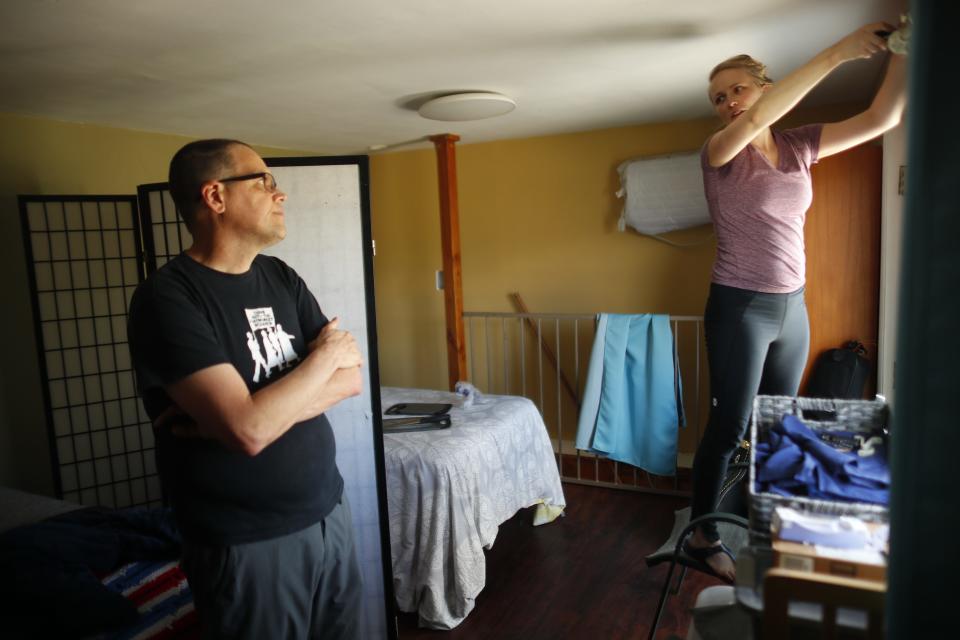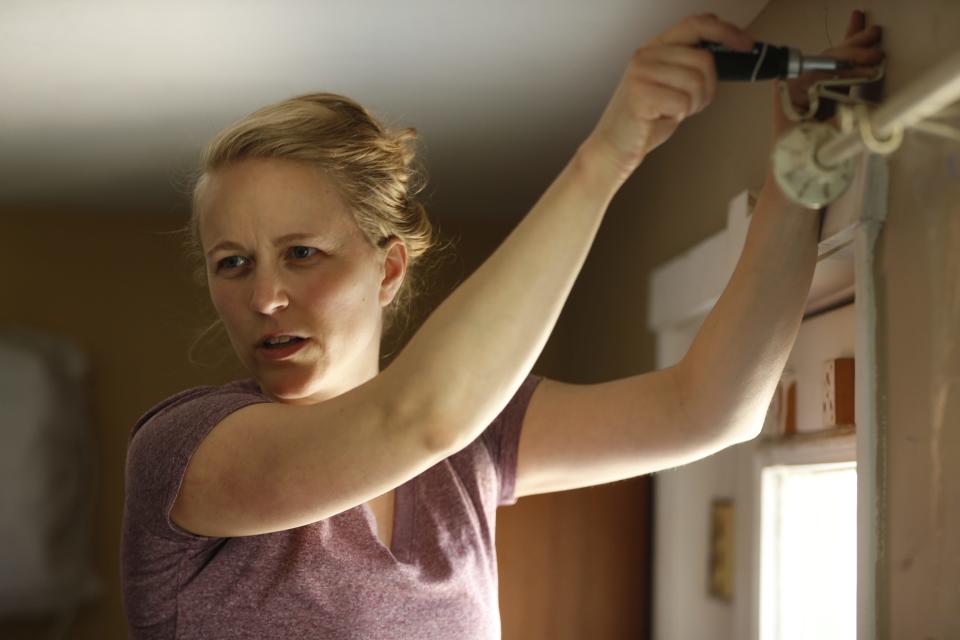Nurses on the front line of a pandemic leave their homes to protect their families
It was barely 2 p.m., and already Jason Odhner was dreading the next morning.
He had one more night with his wife. One more night with their newborn son. An early-morning shift in a hospital ICU, standing on the front lines of a pandemic. Then he’d drive toward home. But he wouldn’t stop there. Instead he’d return to another house, right across the alley. He’d strip off his scrubs and step into a strange new existence. One that had no end in sight.
Now he stood in his new bedroom, surrounded by empty walls. He thought of his wife, sound asleep at home.
“I haven’t even moved out,” he said, “and I already miss her.”
Odhner, a 43-year-old nurse and new father, knew what was coming. He worked in the Ebola epidemic, and saw how quickly that disease spread. He understood that he’d likely be exposed to the new coronavirus, which has killed medical workers in China and Italy. Even if he never felt sick, he could bring the disease into his home, making him a risk to his family and his wife’s retirement-age parents.

He also knew the city needed every nurse it could find. The virus threatened to overwhelm health care systems around the world, straining supplies and staff, and the worst had yet to come to Phoenix.
Odhner saw only one option. He’d move out of his home, away from his family, and into a small casita that he’d share with another nurse. They’d weather the pandemic together, spending most of their time at work and the rest in self-imposed quarantine. They'd stay as long as they needed — even if one of them contracted the virus.
They'd take it a month at a time.
“Can’t plan a pandemic,” said Lydia Corriveau, a close friend and new roommate, who hadn't yet told her family about the move. She stood atop a past-its-prime deck chair, installing a set of blackout curtains over their bedroom windows.
“The problem with global pandemics,” Odhner said, “is they don’t work on anybody’s schedule.”
Corriveau, 32, worked on a cancer floor but planned to move into an ICU as soon as possible. She tightened the last screw and dropped a curtain into place. Light fled the bedroom.
“I’m not thinking long-term or short-term,” she said.
The house was her idea. She’d been staying with her sister, who was eight months pregnant and planned to give birth in her home. The thought of bringing a virus into the home rattled Corriveau, so she talked to Odhner. They lived a few blocks from each other, and Corriveau volunteered at a nonprofit medical clinic Odhner co-founded.
Odhner happened to know the perfect place. He owned the house across the alley, a teal-blue duplex surrounded by flowers and hand-painted murals. Normally, he rented out every room, but a lease for the casita in the back had fallen through. Maybe they could put it to good use.
They called it a Frontline House. Within a week they had a house full of furniture, enough canned beans to last a few weeks and an agreed-upon set of house rules, based on Odhner’s experience working in the West African Ebola epidemic.
They promised to shower after every shift. To wipe down surfaces as often as they could. To treat each other like family. To take their temperature daily, and post the results on a whiteboard. To share finances fairly. And if one of them fell ill — a possibility they both had come to accept — the other promised to treat them.
The laundry room became the changing area. As soon as one of them walked into the house, they had to strip off their scrubs, change into regular clothes and walk straight to the shower. The dirty scrubs would go into a sealable container by the door.

Odhner posted the rules on Facebook, in a group he called #FrontlineHouses. Within three days, it had more than 50 members from across the Valley. Some were looking for places to stay. Others had rooms for rent, as cheaply as possible. One woman didn’t know what to do.
“…my husband is an ER doc,” she wrote. “He and I have discussed this and I’m just trying to figure this out.”
Odhner and Corriveau figured it out on the fly. As they unpacked, they tried to make the strange house feel like home. Corriveau stuffed workout gear into one corner of the bedroom, and stood a banjo in the other. Odhner showed her the bidet in their bathroom. They hung art in the kitchen, art in the front room, art by the door. Corriveau opened a wide plastic tote, filled with her collection: A bright print of cactus flowers. A wood-framed reminder: You are exactly where you are supposed to be.
But the best part, Corriveau thought, was the balcony outside the bedroom. From there they could see everything. Below them was the garden, the flowers, the murals. In the distance was the Phoenix skyline. And to the left, just two doors down, Odhner could see his own house.
He tried not to think about what he’d be missing. About how much of his son’s life he’d be forced to see from a careful distance. How long could he last like this, waving to a son he couldn’t hold? The pandemic could last months. A year, maybe. Odhner couldn’t say how long he was willing to stay.
“I’m not going to touch him,” Odhner said. “But I can see him.”
His son's name was Levi. He was exactly 1 month old.
They’d named him after an abolitionist, Levi Coffin, a white man who used his privilege to help those in need. A man who understood sacrifice and the virtue of generosity. Odhner hoped his son would follow that path.
“He was born into complicated times,” he said.
A few minutes later, as he and Corriveau organized the cooking oils, Odhner’s phone rang. It was his wife, Liz, calling from home.
“Hi, Beloved,” he said. His wife’s voice rolled through the phone. “You were asleep, and I’m just packing,” Jason told her. “But I’ll come home now, and spend the day with you.”
Coronavirus in Arizona
As a public service, we are offering coverage of the pandemic free of charge. If you want to support local journalism, subscribe.
LIVE UPDATES: The latest COVID-19 outbreak news
FULL COVERAGE: coronavirus.azcentral.com
MORE RESOURCES: How to stay connected | Your questions, answered | 10 things you should know | Can I get tested?
Coronavirus in AZ
LIVE UPDATES: The latest COVID-19 outbreak news
FULL COVERAGE: coronavirus.azcentral.com
Reach reporter Alden Woods at awoods@arizonarepublic.com or 602-444-8829. Follow him on Twitter @ac_woods.
Subscribe to azcentral.com today.
This article originally appeared on Arizona Republic: Nurses leave home to protect their own families from coronavirus

